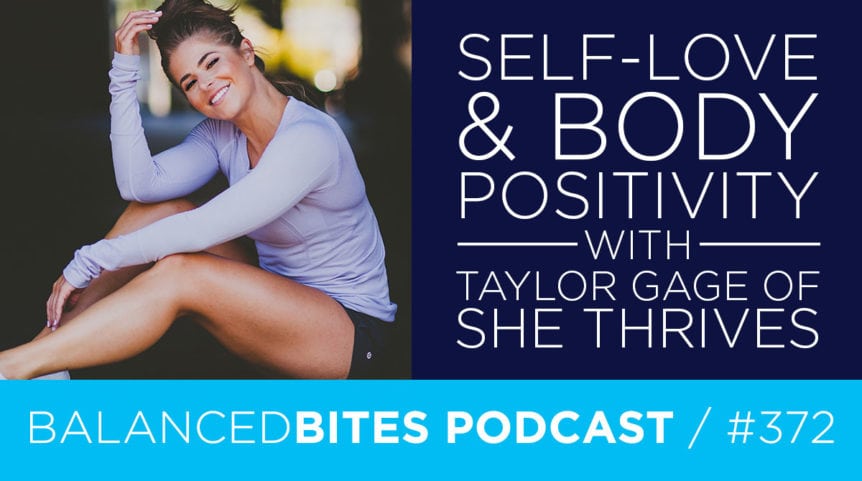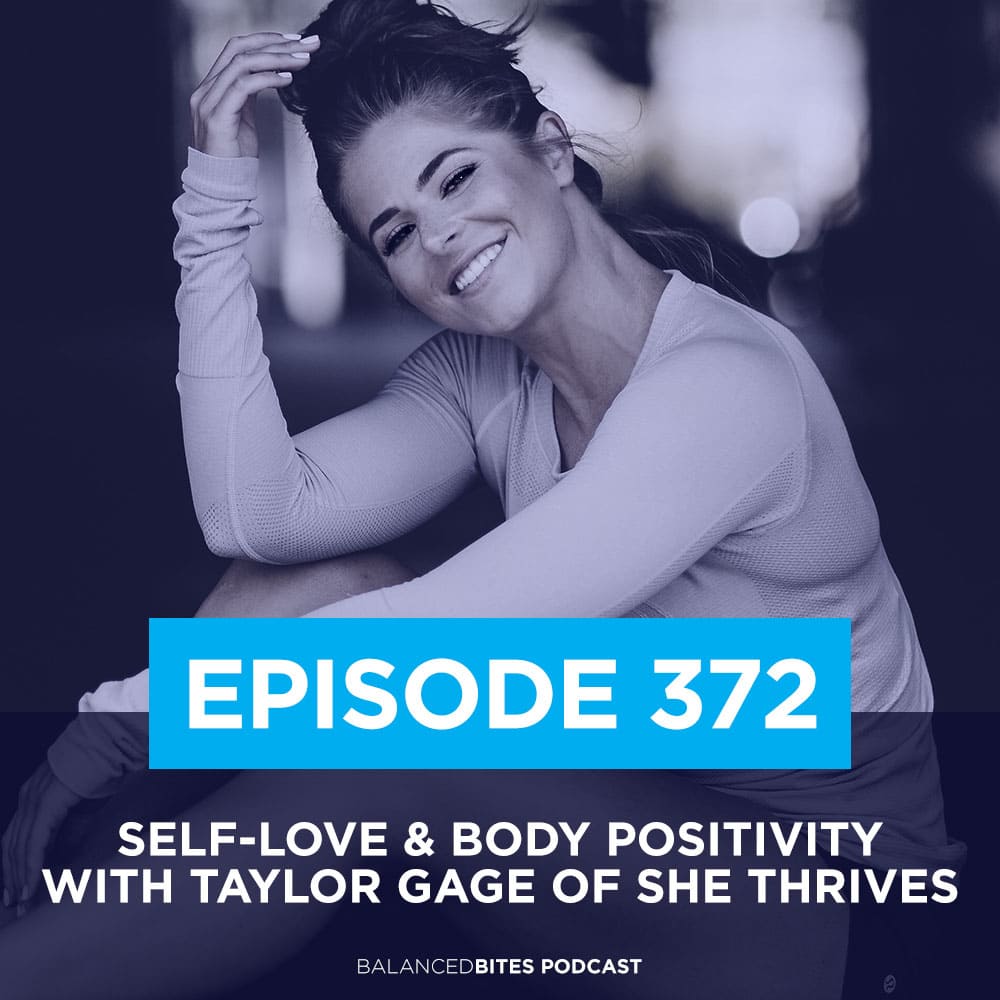 Topics
Topics
- News and updates from Diane [1:54]
- Post-baby body positivity [3:30]
- Body acceptance while wanting change [15:37]
- Outside influence on acceptance [25:42]
The episodes are also available in iTunes, Spotify & Stitcher.
![]()
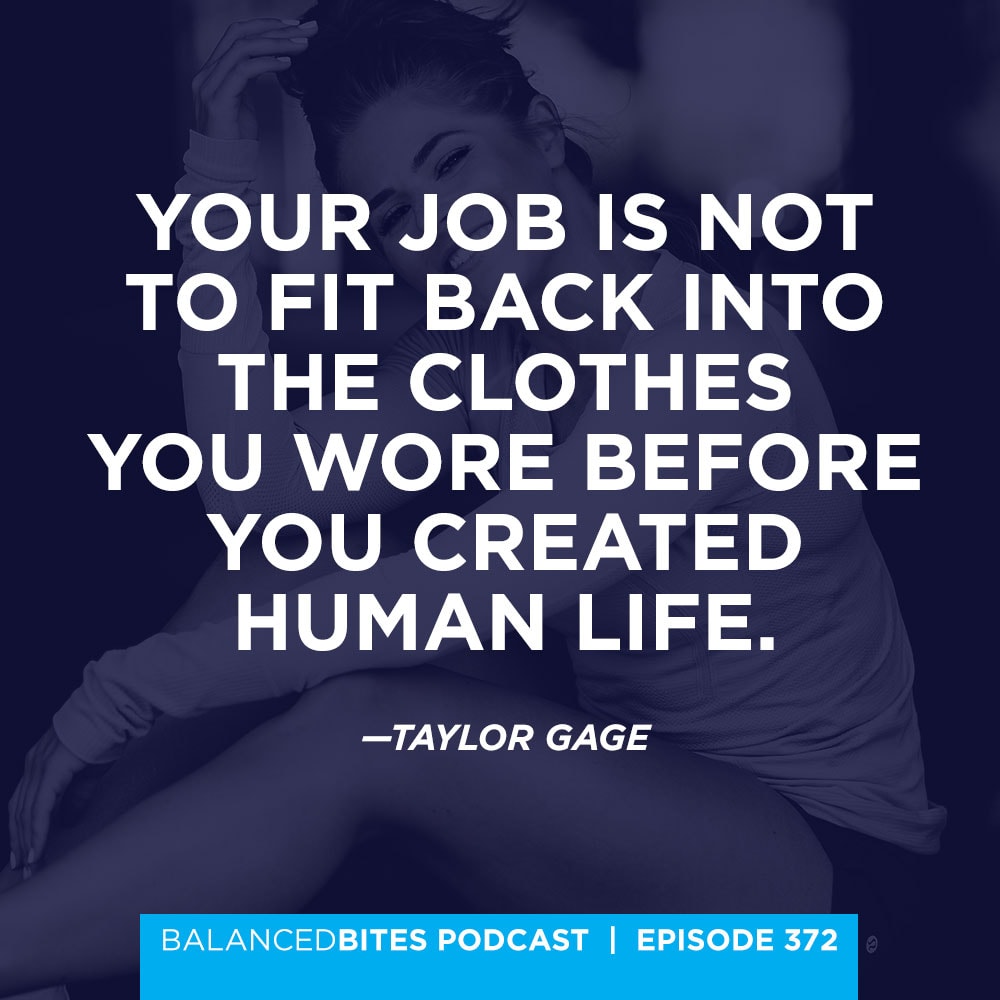
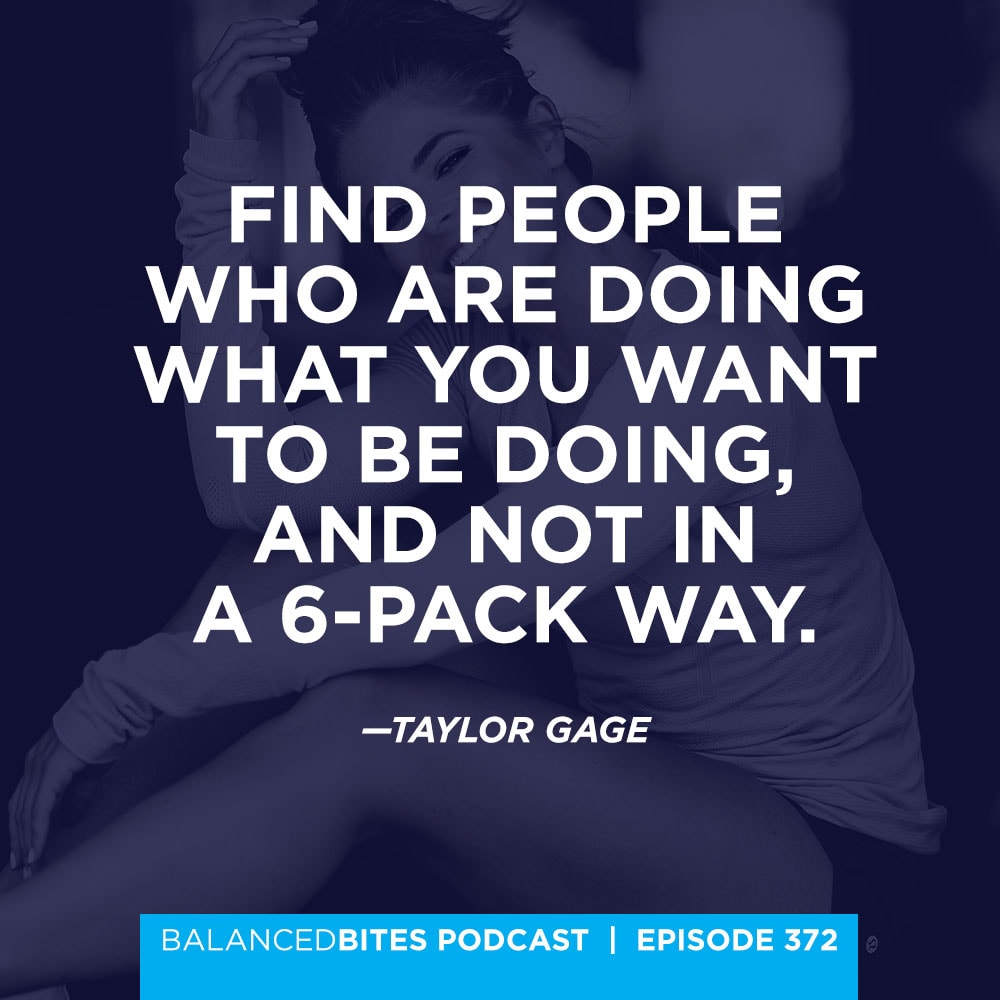
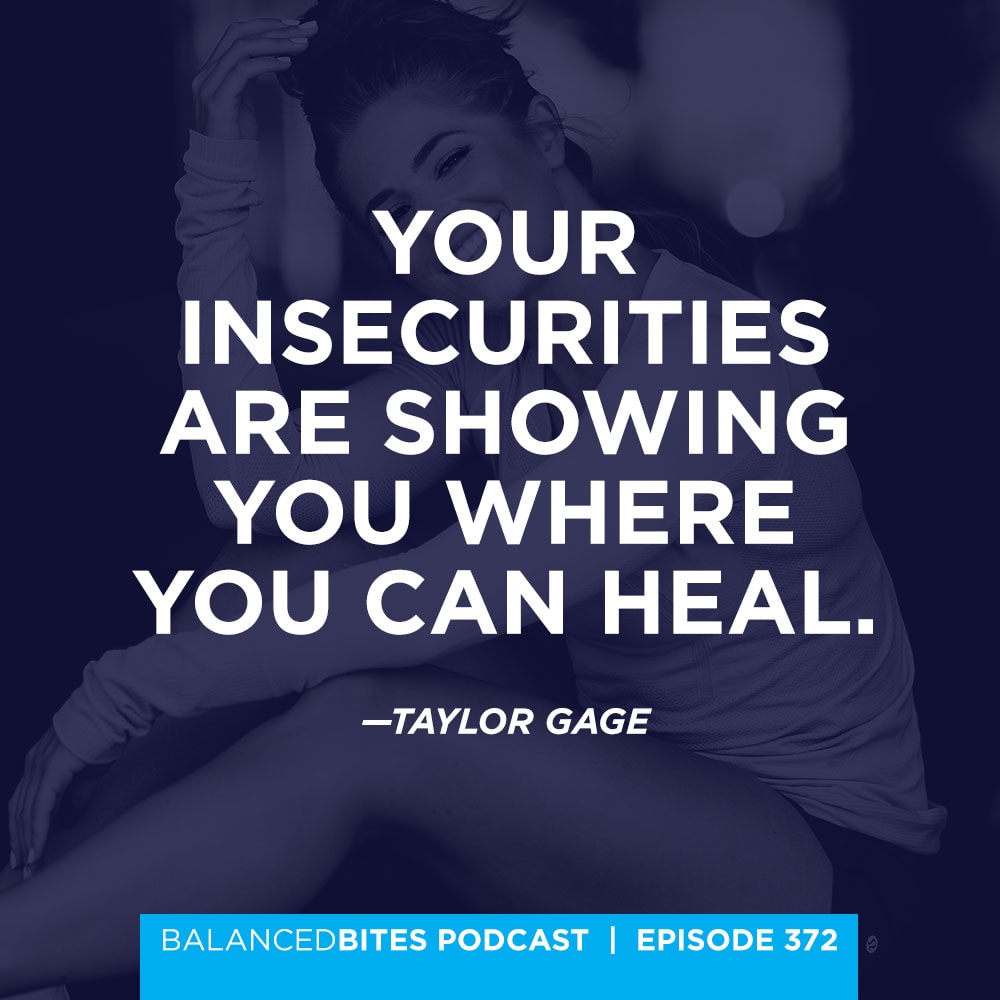
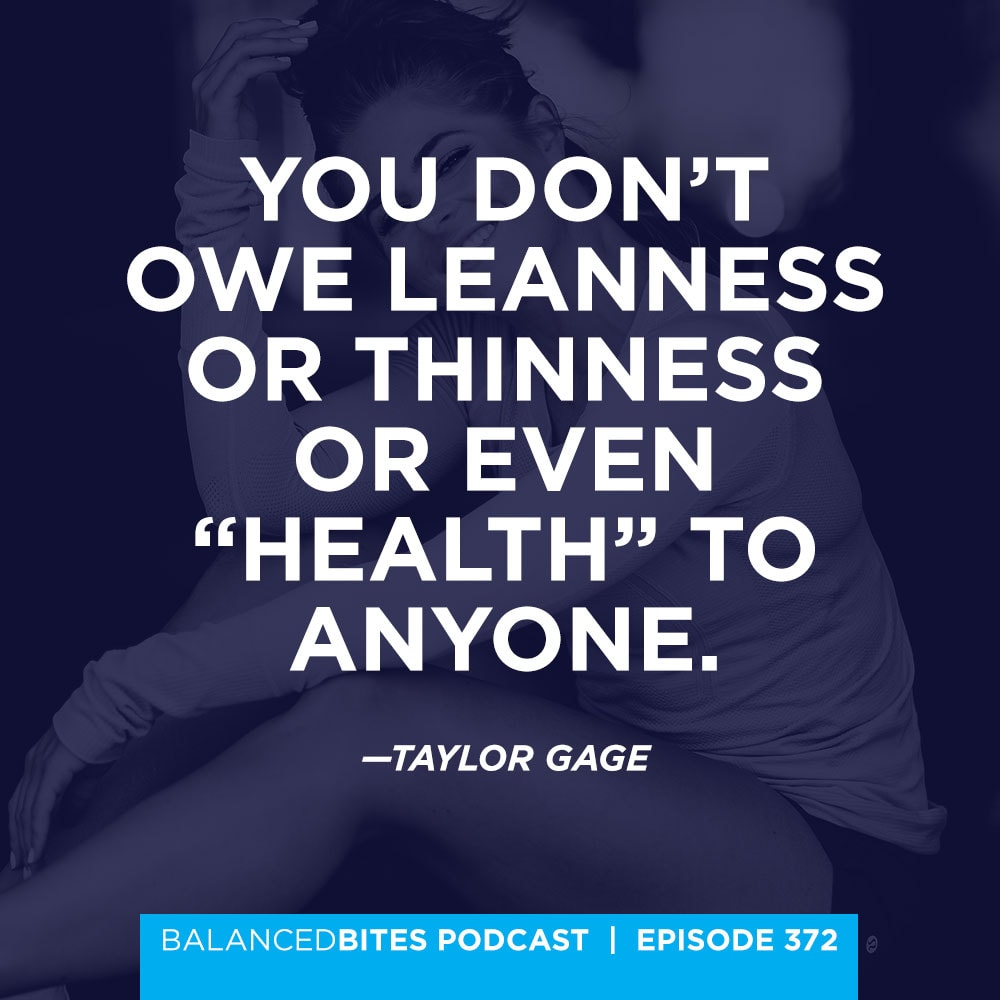
You’re listening to the Balanced Bites podcast episode 372.
Diane Sanfilippo: Welcome to the Balanced Bites podcast. I’m Diane; a certified nutrition consultant, and the New York Times bestselling author of Practical Paleo and the 21-Day Sugar Detox. My newest book, Keto Quick Start, will release on January 1, 2019. I live in San Francisco with my husband and fur kids.
I’m the co-creator of the Balanced Bites Master Class with my podcast partner in crime, Liz. And together we’ve been bringing you this award-winning podcast for more than 7 years. We’re here to share our take on modern healthy living, answer your questions, and chat with leading health and wellness experts. Enjoy this week’s episode, and submit your questions at http://blog.balancedbites.com or watch the Balanced Bites podcast Instagram or Facebook accounts for our weekly calls for questions. You can ask us anything in the comments.
Remember our disclaimer: The materials and content within this podcast are intended as general information only, and are not to be considered a substitute for professional medical advice, diagnosis, or treatment. Before we get started, let’s hear from one of our sponsors.
Liz Wolfe: Today’s podcast is sponsored by Vital Choice wild seafood and organics. America’s leading purveyor of premium, sustainable seafood and grass-fed meats, and a certified B corporation. As the days begin to cool down, it’s time for hearty, healthy, high protein foods. Vital Choice specializes in superior, sustainable wild fish and shellfish, which offer unrivaled bounties of omega-3 fats and vitamin D. You’ll also find mouthwatering grass-fed meats, organic bone broths, paleo friendly burgers, dogs, and bacon crafted from wild salmon, free-range bison, pastured pork, and organic grass-fed beef. Be sure to save 15% on one regular order with the promo code BBPODCAST or get $15 off your first Vital Box with the promocode BBVITALBOX from now through the end of the year.
1. News and updates from Diane [1:54]
Diane Sanfilippo: Before we jump into today’s episode, which is a continuation of my conversation with Taylor. I’m so excited for you guys to hear the rest of this. We had such a great time chatting that, as you can tell, we had to split it into two episodes. A couple of quick updates for you. Keto Quick Start, you guys, it’s coming out January 1, and I will be on tour starting the first week of January on and off throughout January, February, and March.
It won’t be as crazy as last year when I was on the road for what seemed like three straight weeks. It was totally intense. This year, I’m going to be breaking it up a bunch. Hitting some cities, coming home, etc. So, stay tuned. I’ll be announcing dates very, very soon. Can’t wait to see you on the road.
Liz Wolfe: The Balanced Bites podcast is sponsored in part by the Nutritional Therapy Association. The NTA trains and certifies nutritional therapy practitioners and consultants (including me; I’m an NTP), emphasizing bio-individuality and the range of dietary strategies that support wellness. The NTA emphasizes local, whole, properly prepared nutrient dense foods as the key to restoring balance and enhancing the body’s ability to heal.
The NTA’s nutritional therapy practitioner program and fully online nutritional therapy consultant program empower graduates with the education and skills needed to launch a successful, fulfilling career in holistic nutrition. If you're interested in learning about holistic nutrition but don’t necessarily want to become a practitioner, check out their new Foundational Wellness course. To learn more about the NTA’s nutritional therapy programs, resources, and to enroll in their free course, Nutritional Therapy 101, visit http://www.NutritionalTherapy.com.
2. Post-baby body positivity [3:30]
Diane Sanfilippo: Today I have a fun guest with me, Taylor Gage, of She Thrives on the show. We’re talking about body positivity and self-love. I know you guys are going to love this episode.
To give you a quick background on Taylor, she is a blogger, podcaster, portrait photography, and a CrossFit level 1 and USA weight lifting coach. She’s also a New Yorker turned Seattleite who loves to eat, laugh, and keep it real. Her work covers a range of topics including fitness, nutrition, mindset, ad personal development to healthy habits and happy living; self-love and confidence.
Her mission is to help women empower themselves so they can ditch the shoulds and the shame and live their biggest, baddest, most fun life.
So this one is on body positivity post baby, which I know neither of us can talk about from experience, but we will see what we can do for you. So, Neolithic Elizabeth. That’s a fun name. “Body positivity post-baby. I’m 9 months postpartum, in love with my baby, working out regularly, eating paleo, but my old clothes are still a little tight. Haven’t lost that “last 10-15.” Liz has spoken before about this. My BMI is technically in the overweight category. How do I feel positive if I’m not considered “healthy weight” or BMI while I’m working my butt off and raising this babe?”
Taylor Gage: Ok, a few things here. Number one, I don’t know how many crossfitters listen to this show, but I heard somewhere that Rich Froning’s BMI is like, he’s in the red zone. Totally dangerously unhealthy.
Diane Sanfilippo: Elite level athlete.
Taylor Gage: He’s literally the fittest. So, I wouldn’t put too much attention into that BMI number. But just to side-step that ask how do I feel good, right, in this body that’s going to be different? Or maybe isn’t being viewed as healthy. I would say a couple of things. One, it’s different because you just created life. So that’s kind of a big deal. {laughs} Like, let’s not diminish that. That’s incredible. And your job is not to fit back into the clothes that you wore before you created human life.
I just; oh. My blood pressure just; I got really upset right now. I think this is something that…
Diane Sanfilippo: I think we can both feel upset for women when we recognize how important that whole period of time is. And it’s so heartbreaking. I understand it; I do. I have a pair of jeans; I didn’t have a baby. What’s my excuse? I’ve got a pair of jeans I’m like; I don’t think I can get one leg into both of those.
But it’s so heartbreaking to think you would have just gone through this whole experience, and then have any feelings of self-doubt or negativity or lack of self-love. Just because. Throw away those jeans, first of all. I definitely had a moment recently. I will tell you this; this is real. Just buying some new clothes that fit. Buy them. And if you want; I’m wearing a loose flannel shirt right now. It’s a size large. I’m 5’4”. I have no business. I’m like; I’m usually a small, sometimes a medium. Whatever. I’m just saying, there are actual people who need to be tall and fit into this.
Just putting clothes on that aren’t uncomfortable is; I don’t know, 30-50% of the game. Because if you're holding yourself back just because you keep putting on the same pair of pants before you brought new life into this world. I think that’s a practical thing you can do, to just be like; my pants fit!
Taylor Gage: {laughs}
Diane Sanfilippo: Whatever! I don’t care what size they are. But they button and fit. And just give yourself that grace. I don’t know.
Taylor Gage: I think there are a few different things at play here. I think one of them definitely comes back to the culture that we live in, and how prevalent we see; especially celebrities. They push out a baby, and then they’re on the cover of Sports Illustrated the next day being like; hey, it’s not even a thing! Dude, that’s not reality for most people. It’s just not like that.
So I think there are a couple of things you can do. Actually I think it’s kind of all the same thing. But there are a few different avenues or ways you can get there. And it’s basically; curating and taking responsibility for your environment.
So when I say that; I mean, number one, your social media feeds. Go through your feeds and find some women who are in the place that you're in, and speaking, and living the life in which you wish you could and thinking of themselves. Find people who are doing what you want to be doing, and not in a 6-pack way. But in the be happy with where I am way. And follow those people. Get some of that good ju-ju into your life.
Secondly, like what Diane just said. Take responsibility for your closet. A closet clean out is something that I have my clients do a lot of. Because it’s another one of these; it’s metaphorical. It has bigger implications than it seems like. Because if you are waking up every single morning, and you're opening up your closet door, and you're looking at an actual room of things that you don’t like, or make you feel shame, or make you feel like you're not good enough, or you're not there yet, or you should be in a different place. Girl, that is wreaking havoc on you. That’s not healthy, that’s not positive, that’s not serving you.
The things in your closet should only be things that bring you actual joy. Like maybe it’s some old vintage thing that your mom had, or maybe don’t wear but it means something to you. Or that you love. Or that fits you. And that doesn’t mean you have to throw everything out. You can put stuff away in the garage or whatever. Get it out of your line of sight day in and day out.
I don’t think we really understand the importance of our environment in every single way. Our physical environment, our emotional environment. The people we surround ourselves with. Because it creates the lens through which we’re kind of experiencing everything and providing feedback. So it’s tough to just shun these things that our culture is telling us all the time. Yeah; you’ll fit back in your jeans in two weeks after you create a human. Don’t even worry about it.
Diane Sanfilippo: Or in six months or even ever. I think it’s really important to also recognize that this is not the same body. It’s done something totally different. And I’m not saying you won’t ever get back there. Or what you should or should not want or expect of yourself. It has nothing to do with that.
I think, first of all, giving yourself a little more grace and a little more time. I just don’t think 9 months is that long. I know some women who are like; well, I’m not really going to worry about what happens to me after each baby until I’m done having babies. Because, this time period is for nurturing the baby, and taking care of it. Him, her; saying it sounds terrible. But you know what I mean.
I think I’ve always had a very deep fear of this situation for myself. And respect for it at the same time, that I pretty much knew or have known that I don’t think that I could personally have handled it. When I was very young, I was like; I’m really scared of physically getting pregnant and what that would do and how I would handle it. And I think when I got to college and gained a bunch of weight, and then lost the weight and I went through all of this stuff. I think that’s always been this fear that if it happened for this very uncontrollable reason of being pregnant.
So it’s like; I have a lot of reverence for this experience. Because I think no one is allowed to judge you. No one is allowed to have any say. Nobody knows your pregnancy or birth experience. Nobody knows how much stress you're under once the baby is here. How the baby is sleeping or not sleeping. How much help you have or don’t have. And I think a lot of that comes down to, again, just this judgement.
Then in this case, for Elizabeth, what if you stop judging other women for where they’re at 9 months postpartum and realize that when you do that, you're creating a breeding ground within your own mind for more judgement of yourself. And instead of focusing on that, where you “should be” or having these pants that fit.
First of all; on the practical side of things; I get having a favorite pair of pants that you don’t want to get rid of. And at the same time; who else is listening who has lost weight; what’s the first thing you want to do when you lose weight? Go shopping. I don’t want to wear those old pants. I want some new pants. That’s my little; oh, treat myself. Go buy something. Although I did that; I gained some weight, I’m going to buy some clothes. {laughs} Either way.
Taylor Gage: Yeah, I do the same thing.
Diane Sanfilippo: Yeah. But I do think on the practical side, working out regularly, just staying the course. Just staying the course, and knowing, and trusting your body to do what it needs to do and not pushing it for an aesthetic goal just because. I think social media is awesome, and it is also so dangerous. Because we’re seeing; we’re not only now just seeing a celebrity who probably had a surgery right after their birth, because nobody is bouncing back like that naturally. Maybe not nobody; like 1% might; their body “bounces back” naturally very quickly. But now we’re seeing a lot of other people. And you just don’t know the backstory. You don’t know what they’ve been through. You don’t know.
And even if; I just want to say this, too. Even if you're comparing yourself to another mom who seems to have had a really similar experience, and she’s also 9 months postpartum. You just never know the whole picture of someone’s life.
Taylor Gage: And you're 2 different bodies! You're two different humans. You're on two different paths. I think everything you just said really holds true. And I just want to add; just remember that you don’t owe leanness or thinness or even “health” to anyone. You don’t owe it to your doctor. You don’t owe it to that pair of pants in your closet. You don’t owe to the people looking at you. You don’t owe it to anybody. And I would encourage you, instead of focusing on the BMI or these metrics that aren’t really…
Diane Sanfilippo: Yeah, not that valuable.
Taylor Gage: I would really encourage you to instead focus on your feeling and emotional health doing the things that we’ve talked about. Also just; how do I feel today? How do I want to feel today? Maybe I really want to feel like I have a lot of energy, and I’ve got my; I’m vibrant, right? What’s one thing I can do today that will bring me that feeling? Maybe it’s going for a walk out in the sunshine. Maybe it’s calling my friend and laughing for an hour about silly stuff. Whatever it is. Ask yourself really how you want to feel, and see if you can kind of reverse engineer something from that standpoint versus chasing an arbitrary number or thinking you owe a certain aesthetic to the world. Because girl, you do not. You do not.
Diane Sanfilippo: {laughs}
Taylor Gage: {laughs}
Diane Sanfilippo: She got a hand motion in with that one. I cannot wait; I’m really kind of tempted now. This is recording on a video, and the audio will go to podcast. I’m tempted to load the video to our Facebook page. Because that’s good. Maybe a clip of it. So good. Yes. I’m going to let you end with that little moment.
Taylor Gage: Ok.
3. Body acceptance while wanting change [15:37]
Diane Sanfilippo: So I’m going to move on here. We have a couple of similar questions about body acceptance while kind of wanting things to change at the same time. Which I can totally understand this one. I’ll kind of ask these piggybacking. So the first one is, “How do you work towards accepting things about your body you truly are uncomfortable with or don’t like; i.e. cellulite or aging.” And then the other one from Carlie, “What is a healthy balance between loving your body where it is while at the same time trying to change your body composition?”
Taylor Gage: Yeah, these are great questions. I don’t know that I’m the expert on any of this, but just from my own experience. I think accepting things that you “truly don’t like” I think would come back to what we were talking about in that first Q&A. Which is; first of all, I think the first step here is taking the pressure off yourself that you have to accept it. I think; like I said, it’s a whole new thing that you have to do that is stressful, and you can fail at, and feel like you're not doing well enough at. And I just think we have enough of that already. So just put that to the side.
But I would rather have you ask yourself; why am I rejecting it? Why is this something I feel; why is this a source of shame for me? Because I think if you really follow that rabbit hole down, you’ll get into some real stuff real quick. And it’s not usually about the cellulite or age. It’s like, real stuff that you're getting into in there. Real, deep seated, primal fears.
But I think that’s really good work. Because at the end of the day, when that compassion for yourself. We talked about this a little bit with judgement, because I think compassion and judgement are opposites. So you really can’t have; they can’t exist at the same time. But when you have compassion for your own humanity, and your shared humanity, I think it reminds us that we all have these same very primal fears and needs and desires.
So, when we get down to the bottom of why we don’t like cellulite, we get into some real stuff. And I encourage you to just challenge that and poke at it and dig and unpack it instead of just feeling like you have to just embrace it with no questions asked. Get into it.
I think those things; your insecurities are showing you where you can heal. But you’ve got to be able to look at them, because it’s scary. And you’ve got to be able to continue to ask why, and dig, and unpack, and then do whatever is necessary to actually heal yourself instead of throwing a Band-Aid on it and being like; “I accepted my cellulite today.” It’s just not that simple.
Is there anything else you wanted to add to that before I go to the next question?
Diane Sanfilippo: Well, you know, one thing I thought was so interesting. Recently I saw an ad on Instagram from Outdoor Voices.
Taylor Gage: Yeah!
Diane Sanfilippo: Did you see that? I posted in my story. It’s a girl in shorts, unretouched, and there is cellulite on her leg. And some dimples. And I have some dimples that have been with me since I’m 14. I mean, they’re better compadres than many people {laughs}.
Taylor Gage: Seriously, same.
Diane Sanfilippo: Right? If I had this when I was 14; it’s just, I can’t get wrapped up in it. It’s there. It’s going to be there.
Taylor Gage: And we all have it!
Diane Sanfilippo: I have the skinniest of friends who also has it. It’s just not about that. So it is what it is. At some point in time, somebody decided it was unsightly and decided to erase it and then we all started to feel like we shouldn’t have it. And that expectation created this problem of us wanting to look good. Which I understand. That’s a primal thing, too. That we would peacock.
Taylor Gage: Totally.
Diane Sanfilippo: Put my lipstick on and want to look good. Which comes back to; I don’t say this as someone who is immune to it. I don’t love getting older. I’m doing my skincare and trying to stay, I don’t know, stay young. Whatever that means. But wanting to look good comes back to lovability, which comes back to the idea of worthiness. Which you talked about earlier. I think if we’re chasing worthiness, we’re losing sight of the fact that we are inherently worthy just because we’re here.
I also think if you want to occupy your mind with something beyond that; because that may or may not feel ok enough for some people. I definitely do feel; I do personally feel a draw to contribute. Whatever that is. So, as someone who is not a parent, I feel like that draw is bigger. I almost feel like there is more on me to be worth something because I’m not somebody’s parent. I don’t have this other job in the world. I don’t know how else to explain that.
Taylor Gage: I know what you're saying. Yeah.
Diane Sanfilippo: But, I do feel like I need to be a positive contributor to society and to the life of others in some way. As a human being, that’s part of what I think is the human experience. Helping others live their life however they want to live it. Whatever that’s going to be. So if you're finding yourself getting caught up, having your worthiness tied so much to how you look, I think this is where we need to shift our focus to how we’re contributing to the world.
And I actually think that part of how you contribute to the world is dropping a lot of those expectations about how you're going to look. And just committing to if you're feeling uncomfortable about it, for long enough, or you get to this place. This is my own example. It’s like; ok, now my body is ready to exercise again. I’m going to do it. Because that’s part of my integrity to myself. That I do take care of myself, so I can keep showing up. And I have the energy to show up. To contribute to the world.
And getting so wrapped up in that and bringing ideas to life and supporting other women and just doing that kind of work. That’s not to say that I can’t just sit still and chill out and feel fine and worthy. Trust me, I will watch Bravo TV, and I’m not like; ugh, I’m not contributing! I’m fine with it. It’s just more not being so focused on how the jeans are fitting. Or what someone is going to think of how I look when I stand in front of them.
Because actually, I feel like if you can shift the focus from that, and focus on how you're contributing and showing up in the world. I know; and I’m sure this is your experience, too. When presented with another woman who is showing up in the world, you're not judging how she looks. If you are, you know it’s yourself, right? You know that’s your own judgement issue. But you're just there to experience what she’s got going on. You're like; wow; she’s doing this thing. This is really helping. She’s talking about this topic that I want to hear about. And you don’t even notice what physical form she’s in.
You know what I’m saying? This little pinch that she’s stressing about at night in her room. Or her jeans not fitting. You're just like; whatever, I’m not here for that. That’s not what I came here for. So, I want other women to free themselves of that stress. Because I’m not here for the size of your thighs. It’s not important to me. I’m not living a better life because your thighs are thinner.
Taylor Gage: {laughs}
Diane Sanfilippo: Do you know what I mean? Or that you're more ripped. Like, good for you, you have a six-pack. And that’s not really a contribution to the world that is necessarily uplifting.
Taylor Gage: It’s true.
Diane Sanfilippo: I’m not a hater; have your six-pack. Whatever it is. I don’t care. I’m just saying, there’s a difference between a contribution and visually showing up. You know what I mean?
Taylor Gage: Yeah. And I think the challenge is they get conflated with each other. Like we’ve said this 7 times already on the show, but I’m going to say it again. Your worth is not your appearance. Your legacy is not the cellulite on your legs. That’s not what people are remembering about you, or talking about. That’s not where your value is.
Diane Sanfilippo: And if they are, they’re not your people.
Taylor Gage: Right. They have their own stuff that they need to sit down and work through. So I think a lot of it is easier said than done. But that’s why I’m like; I don’t want you to feel like you have to accept this stuff. I would rather have you ask why it’s uncomfortable for you. Where did you learn that this is bad? Where did you learn that this is wrong? Where did you learn that you aren’t enough, or you don’t have a status or you don’t have a value if this is showing and people know that you have cellulite like everybody else.
But I think the more you can remember that everybody has it, it makes it easier for you to be more gentle with yourself. Because like I said, it brings us back to the shared humanity that we are more alike than we are different. We all struggle with the same things. And we all want the same things for ourselves for other people. So I don’t want to get too; I don’t know. But it’s important to remember because we can get, like you were saying, really hyper focused on these things that just aren’t what it’s about. And the more you can kind of zoom out and get curious and remember that we’re more alike than we are different, I think it’s easier for us to really get to the bottom of this stuff. And ultimately dismantle it in our own time. But I think that’s how we do it.
4. Outside influence on acceptance [25:42]
Diane Sanfilippo: Well this is a good segue. There’s a question from Liv Love Try. “I’ve been overweight my whole adult life. My mother is concerned; mom’s, lol. But out of one side of her mouth she says, “Have you lost any weight?” And out of the other side comes, “What do you want for dessert?” while holding something yummy under my nose. She means well, but it makes it hard to spend time with her. Note; she also had a weight problem for a long time.”
And then; these two questions are kind of about other people interfering, etc. And then there’s one from the Empowered Equestrian. “How to not let others close and otherwise negative comments get to you; especially from people you love and respect in relation to comments both about yourself and about themselves. Like people who self-shame. Thanks.”
So, what’s your take on this?
Taylor Gage: I think it really is, like you said, kind of just carries right off of what we were just speaking about. Because, here’s the thing. At the end of the day; we all have the same needs and fears. But, we cope with them differently. We show them differently. We handle them differently. That is kind of where some of this stuff comes from. I think the people who are doing a lot of self-shaming talk themselves or shaming a lot of other people or saying a lot of negative comments about other people. That’s just their way of managing the ways in which they themselves feel insufficient. It’s their own insecurities speaking.
So it’s not fun to hear somebody speak that way about themselves or about other people. While I do think it’s great to help them maybe realize; at the end, it’s not your job. That’s not on you. That is on them, and with the mom thing, too. It’s like; just because she’s your mom doesn’t mean she doesn’t have her own set of issues that she probably inherited from her mother, right? And it’s like; I think a lot of times we always think of our parents as having it all together. They’re just human, too.
Diane Sanfilippo: They do not know what they are doing.
Taylor Gage: Nobody does! Nobody has it together. So, I think it’s just a manifestation of the very basic things that we all deal with, just kind of showing in different ways. And people cope with it in different ways.
And I think it’s important too to not only identify how the people around you are coping with their own things; because that’s on them to do it. But how are you coping with your own feelings of insecurity or being insufficient or not being enough or not being good enough or not ever, whatever it is that’s playing through your head. You also have some behavior patterns and some very regular activities or whatever that you engage in that act as coping mechanisms to either make up for, cover up for, whatever it is. Those things.
And I think it’s equally as important for you to tune into those as realizing that other people’s is their own thing. You know what I mean?
Diane Sanfilippo: Yes, I do. I’ve definitely been guilty of self-deprecating humor, and I’m like; that is… and now when I think about it, if my friend said something like that about herself. I don’t like it when she says that. I’m like; don’t say that about yourself. Whatever, just don’t make a thing of it. Because, the more we make a thing of it the more we magnify it.
And it’s just like; it just gets too deep. Wait, so I wanted to come back to a couple of things on these two questions. The first one about the mother who is saying one thing and doing another. Offering the treats and all of that. This is an example of a really great situation that calls for a hard conversation. And I don’t know that I have always had every hard conversation that I think I want to have with my parents for example.
So nobody is perfect. I think we pick and choose our battles. I think, to your point, we either figure it out on our own and recognize it for what it is, and diffuse the bomb in our own minds of this situation that’s happening. Or we address it. And I think we have to pick and choose. And we’re either going to say; I’m going to let it go, because maybe my parent won’t really understand what I’m saying when I try and level with them.
{laughs} Here’s an example. And this is a little; it might seem silly, but whatever. I’ll just use my personal example, and then I’ll throw it out there for Liv Love Try. I went home several weeks ago and I wasn’t going to have time. I could have made time; let’s put it this way. I could have made time to go to the bank early in the morning to get cash. Because I needed to pay for a haircut or whatever it was. A nail appointment. In cash. But instead, I was like; mom, can I borrow. Literally, I had to borrow $300. It’s not a small amount of money. But I was like; can I borrow this $300. I didn’t know how much anything was going to cost, and I was like; I would just rather have it, and I’ll pay you back.
And the next day, literally actually from the time she put the money down. And this is; my mom is awesome. Loving, supportive. She did not even know she was doing it. So let me just caveat this with that. And I don’t think she listens to the podcast.
Taylor Gage: {laughs} You’ll find out!
Diane Sanfilippo: She’s awesome. But from the time she put the money on the counter, literally, I don’t know how many times she was basically reminding me of the hours of the bank. Just kind of harping on me to pay it back. And I was like; mom. When I have not paid you back in a very timely fashion? It’s been like 6 hours since you loaned me the money. I’m nothing if I’m not good for whatever money I borrow from somebody.
I can understand if someone feels an insecurity around something that has not been upheld in the past or if there’s reason for it. But I was like mom. I texted her. I was like, mom. I gotcha. I know what time the bank opens. And I said; and, if I somehow didn’t get there, you know that I would also; I would probably tell her to email my bookkeeper and be like; send her an invoice, she’ll send you the money. Or whatever it is. You will get your $300.
I’m not trying to devalue $300. But at the same time, in the scale of things that we’re paying for, whatever it is, it’s like she was acting like it was $30,000. You know what I mean? Like she needed this money right back right away. And again, no disrespect. I know she wasn’t like; I need the $300. It was this weird compulsion. And it had nothing to do with me. Because I have never shown up in a way that says I’m not good for the money. We used to keep a tally on the fridge when I was living at home years ago. And it was down to the dollar if I needed to borrow money. We’re talking not that much money. But I would absolutely pay it back. I would get my paycheck and I would pay it back.
So just the perfect example of how this had honestly nothing to do with me. I was like; mom, you just need to see what’s happening right now. And she was like; oh my gosh, you're right. I’m sorry. I did not mean to do that. I said something to her. I texted her. I was like; mom. And that’s how I talk to my mom. I level with her. Because I just kind of let it slide. Moms can be naggy. Or whatever. And to her credit, I don’t know, maybe there was a time when I was like 15 that I forgot to pay for something and she’s not let it go. And I’m like; also, I’m 40. I always pay you right back.
So I think sometimes they can hold onto things. And they’re remembering us as really young kids, and whatever. So then when it comes to this situation with her mom, with the cake or whatever it is. You need to have a hard conversation with her, and say; mom. Here’s how it makes me feel when you make a comment about my weight. And here’s how it also makes me feel when you present me with treats. And tell her how you feel. And let her deal with it. Give her the benefit of the doubt to respond in a positive way. And if she doesn’t, then it’s up to you to decide how you want to either show up and spend time or not.
I think ultimately we have to be honest with people if we want to continue spending time together. Because that goes back to what we were talking about at the beginning. The more times you allow this exchange to happen, the more you're saying that “it’s ok with me that this happens.” And as an adult, the really tricky part.
And I’m really fascinated by this idea of when do we really cut the cord? Because I think it happens somewhere between 25 and 35 for most people. For some sooner, for some later. But I think as we develop into individual whole personalities. Which I’ve seen for most people happening between 30 and 34. Just throwing it out there. And we realize, like you said, our parents are just people. And they’re flawed. And they may or may not have ever dug into who they are and how they’re presenting themselves. And how what they’re saying impacts their kids.
It’s like; you're not a kid anymore. You're actually an adult. And now, you actually do have a responsibility to flip the script and say; it’s actually not ok for you to talk to me this way. You’re my parent; I understand that you love me unconditionally. So I need for this condition to go away. This condition that maybe you love me less because I weigh what I weigh.
Or maybe undoubtedly there’s probably some guilt in there from the mom of maybe it’s my fault that she’s overweight. Or whatever “overweight”; I don’t know what that means. I don’t know you to judge whether your overweight or not. But undoubtedly there’s some guilt in there on her side. Which is why then she offers a dessert. Because she’s like; I don’t want to deny you of this pleasure. Whatever.
Anyway. I’m just saying, I think there needs to be a hard conversation there. And then on the second question; when it comes from people you love and respect, I think you need to be a little bit together about who deserves your love and respect, if they are saying things to you that are negative. And I think we are too quick to love and respect people who don’t deserve love and respect. And I do think, again, that if we love and respect people enough to hand them our feelings and say; here’s how I feel when you do that. Now, how they respond to that, that’s when you get to make that next decision of; do you get to stay in my life or not? And that is painful. But it’s the reality.
Taylor Gage: Yeah. I love everything you just said. It’s hard because I don’t want to do a psychoanalysis of this mother that I have no idea {laughs} who she is, but I think everything you said is right. I think she’s just coping with her own thing the way she knows how. It was probably something she learned in her household. And you know what, she might not even be aware of.
Diane Sanfilippo: Totally.
Taylor Gage: So to your point, you bring it to her. I think it would be a really good conversation for all parties involved. Just all around. Even with the money thing; money is another thing that people carry stories and feelings about that they don’t know. They carry a very particular mindset with. And that’s something I’m working on right now, to challenge my own kind of feelings in that domain around money. But it’s another thing, just like body image, and food, and love, and safety, and attention, and all these things that we want. I think you hit the nail on the head with all of that.
Diane Sanfilippo: I think this was a really good conversation. I think our listeners are going to absolutely love it. I’m not sure if this will end up being one episode or maybe a two-parter, because we got into a lot.
Taylor Gage: We did.
Diane Sanfilippo: We spent a lot of time. But I think it was totally worth it. Taylor, I’m so glad that you could sit down and have this conversation with me. I really appreciate it.
Taylor Gage: This was awesome. I really appreciated this. Seriously.
Diane Sanfilippo: #nosmalltalk.
Taylor Gage: No! {laughs} No, but seriously. It is very cool. Seeing your book in the background and having this come full circle is super cool. And I know you're a four tendencies rebel just like I am; so holla! {laughs}
Diane Sanfilippo: Holla for Rebels! Where can people find you? I know you're on Instagram.
Taylor Gage: Yeah. My website is SheThrivesBlog.com. All of the things are there. That you can get access to. I also have a podcast, that’s just new as of this year, so there’s only like 40-ish episodes.
Diane Sanfilippo: That’s a lot of episodes.
Taylor Gage: But yeah, it is. So that’s She Thrives Radio. And it’s currently just on iTunes and Google Play at the moment. And then, yeah, Instagram is SheThrivesBlog. And that might be it.
Diane Sanfilippo: What’s the program that you created recently?
Taylor Gage: Yeah. I created basically a course that is talking about everything that we talked about today. It’s called the confidence lab. And it’s just like; it’s an audio course so you can kind of listen to it like you're listening to this show. Because I know that’s how people really like to consume content these days. So it’s kind of easy. But it’s really just like a step-by-step process for people to be able to identify, dismantle, work through, and kind of restructure some of the things that are holding them back.
That literally ranges from your body image and physical things to things like going for a promotion at work or starting your own business. Any of these areas where we’re just feeling like we’re not ready, or we’re not good enough, or we’re just terrified of what people are going to think, or say. Or what if we fail? All of those conversations that I know we all deal with all the time. It’s sort of my step-by-step process to kind of get you through that to be able to handle it, not only now, but kind of forever down the road. Because I hate seeing people get held back by their own thoughts. So it’s just a way for you to work through that.
So I’m super proud of it, and you can find that on my website.
Diane Sanfilippo: I love it.
Diane Sanfilippo: Today’s podcast is sponsored by Perfect Keto. Dr. Anthony Gustin and his teams have created a line of supplements that are super clean and effective, no matter what your dietary needs. I’ve been blending their MCT oil powder into my matcha latte lately. Not only are MCTs; medium chain triglycerides; a premium source of your body’s preferred type of energy, and help to fuel your brain and body, but there’s also no added taste. It makes your coffee or matcha wonderfully creamy. Check them out at PerfectKeto.com and use the code BALANCED for 20% off at Perfect Keto; and their sister site, Equip Foods.
Diane Sanfilippo: Ok, guys. That’s it for this week. You can find me, Diane, at http://dianesanfilippo.com. And you can find Taylor at Shethrivesblog.com. Don’t forget to join my email list for free goodies and updates you don’t find anywhere else on my website or on the podcast. And hey, while you’re on the internet, please leave us a review in iTunes or Apple Podcast. We’ll see you next week.

